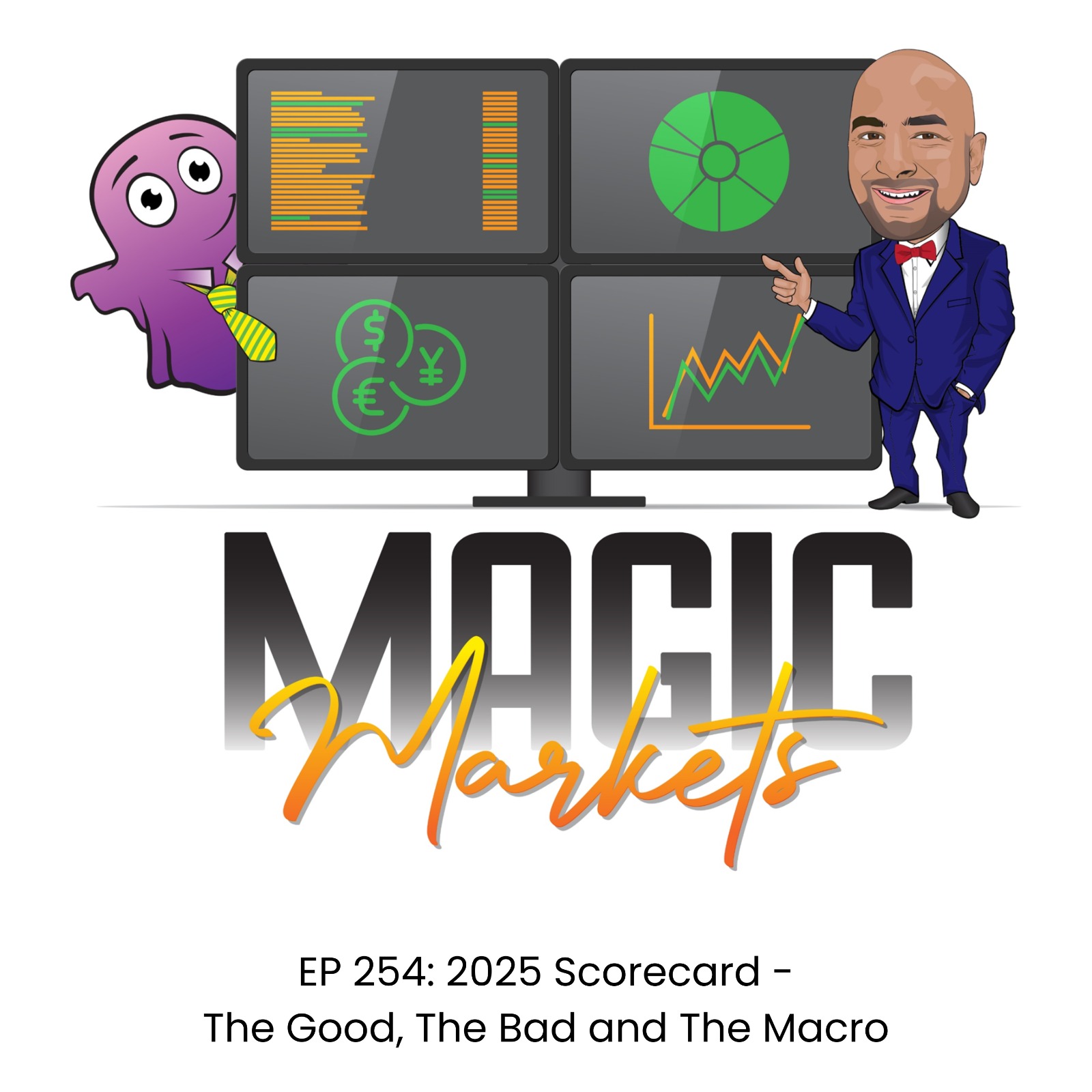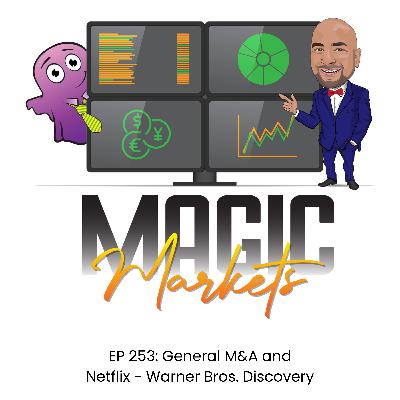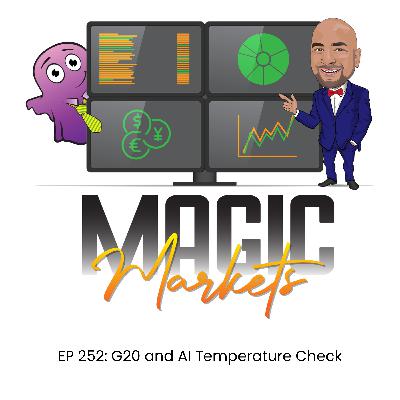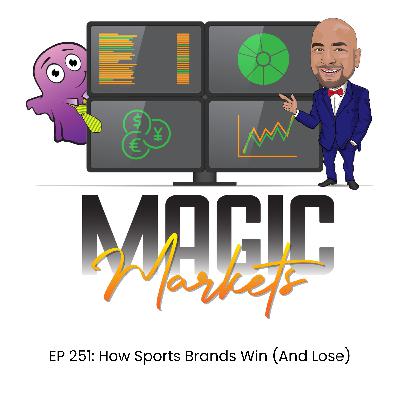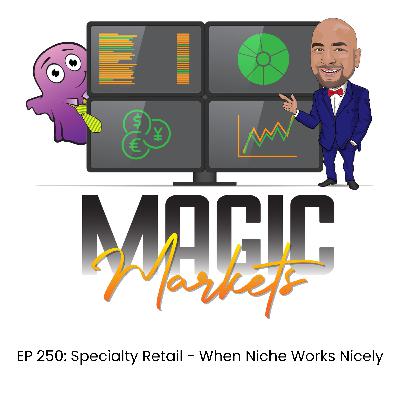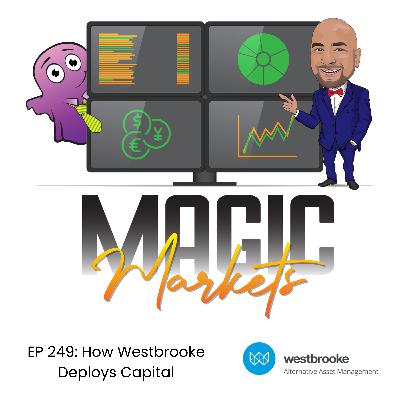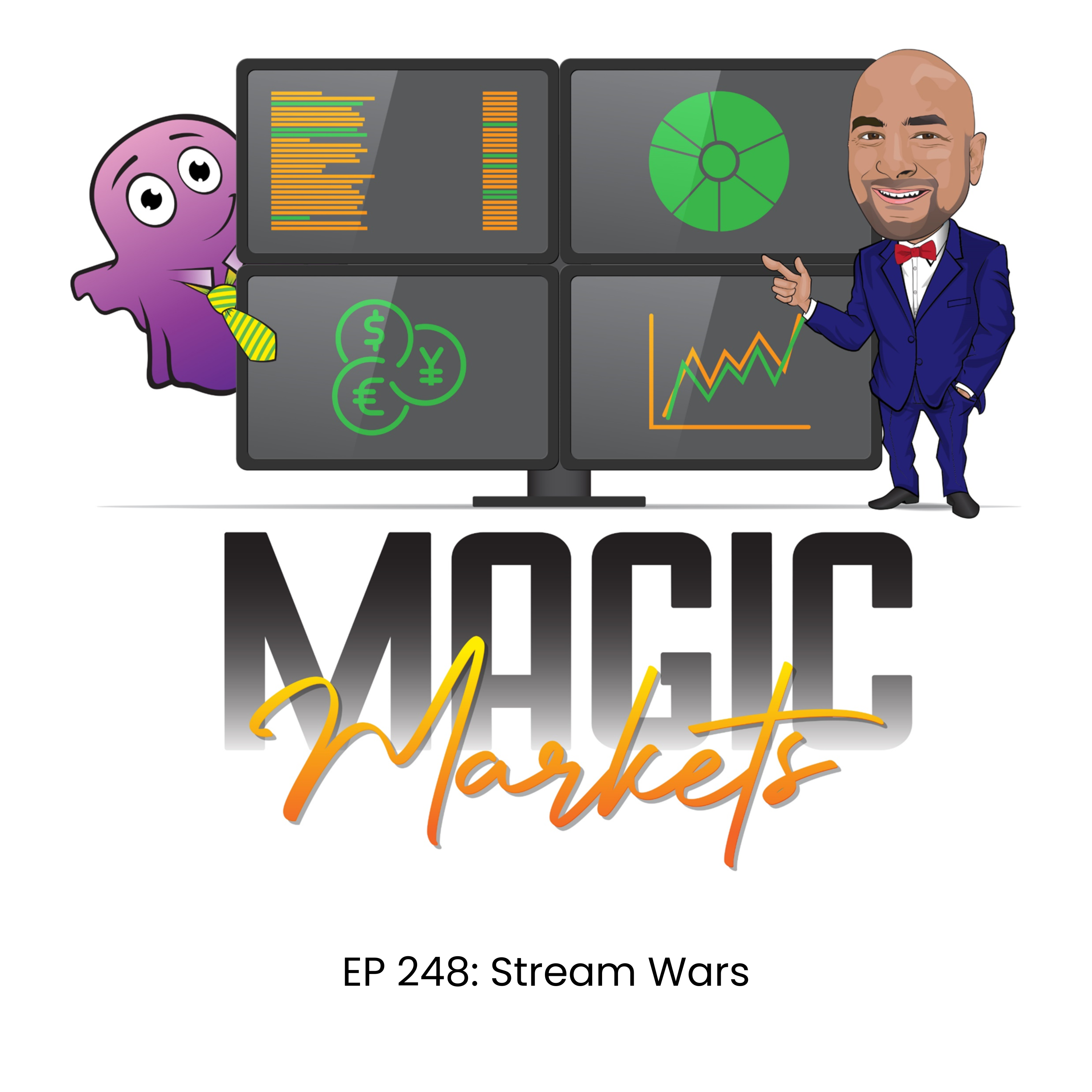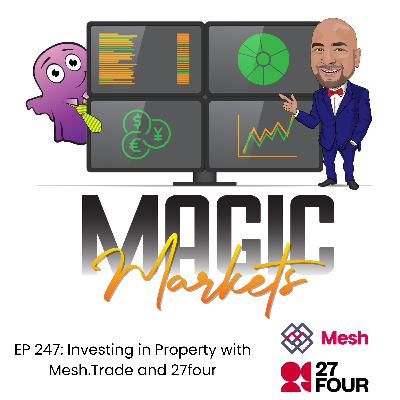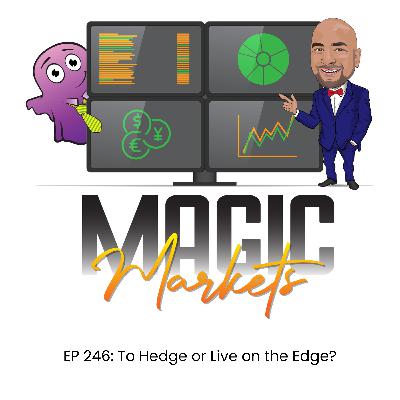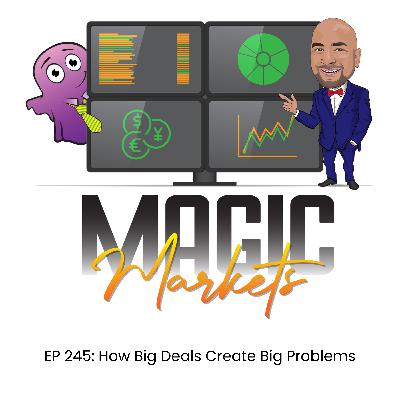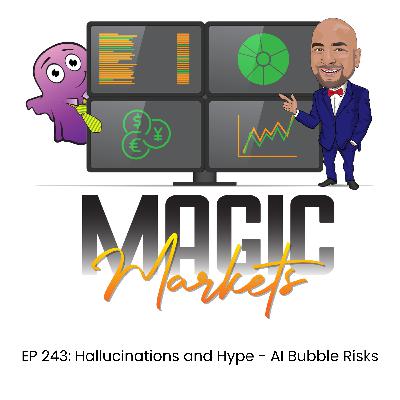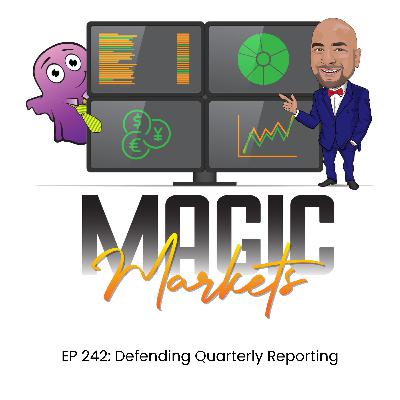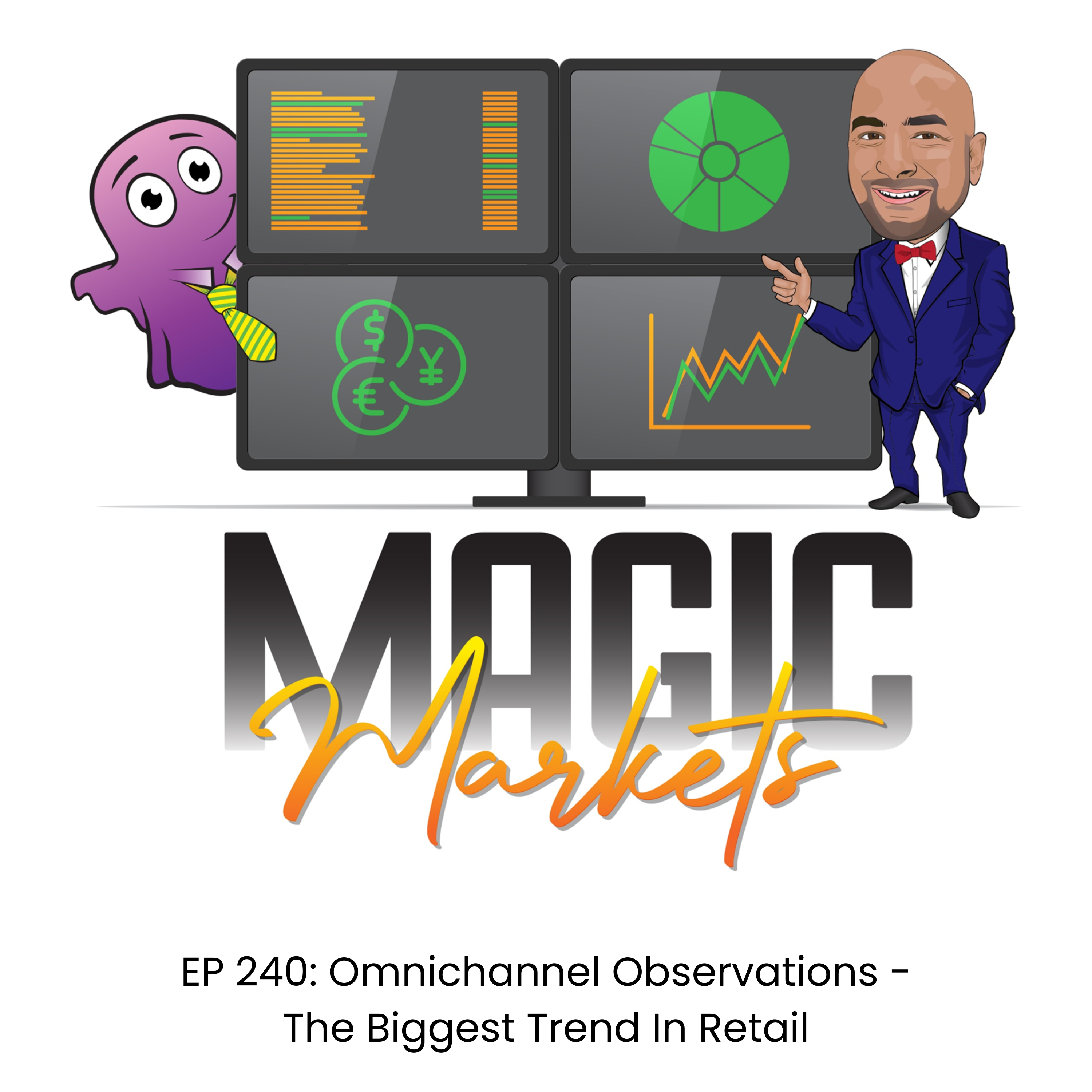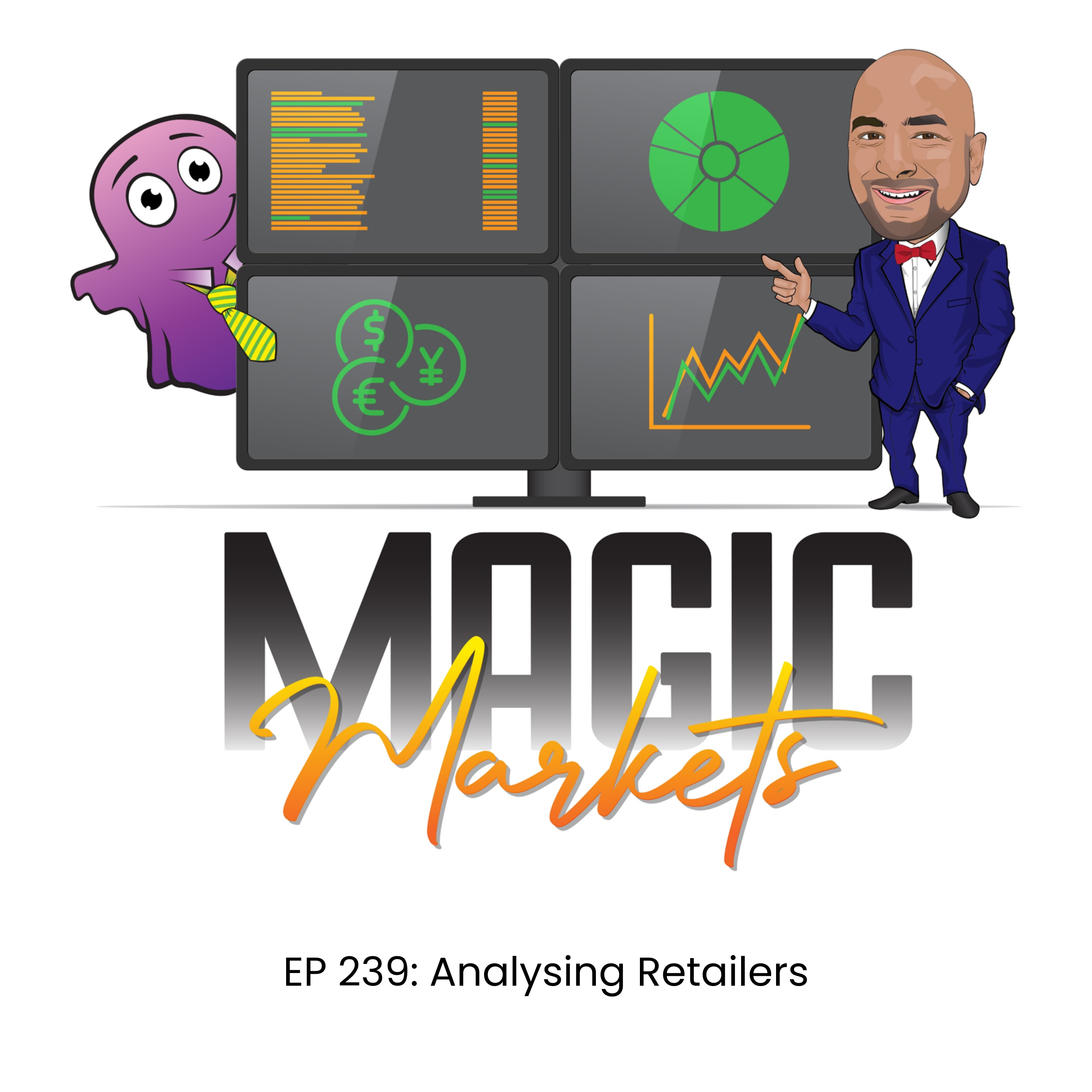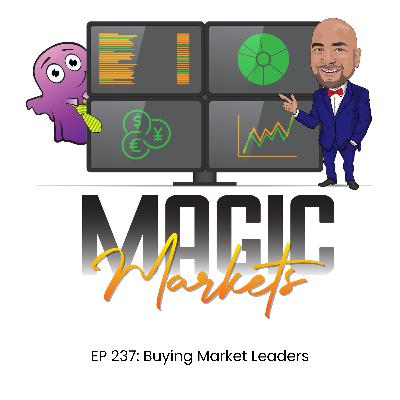Discover Magic Markets
Magic Markets

Magic Markets
Author: The Finance Ghost and Moe-Knows
Subscribed: 259Played: 3,175Subscribe
Share
© 2023
Description
The Finance Ghost and Moe-Knows discuss key market trends across stocks, currencies, fixed income, commodities, macroeconomics and geopolitical trends, helping you understand what's going on out there.
254 Episodes
Reverse
In the final Magic Markets show of 2025, we looked back on a watershed year for geopolitics and the technology sector. With Moe focusing on the macro story and the performance of the various global asset classes, our resident ghost took a bottom-up approach and highlighted the performance of certain stocks in the portfolio.
From US banks through to energy counters and FMCG stocks that threw us a lemon (ahem), there’s much to reflect on. Join us as we bid goodbye to a wild year in the markets and prepare for 2026.
This podcast is for informational purposes only and is not financial or investment advice. Please speak to your personal financial advisor.
With news breaking of Netflix joining the bidding war for Warner Bros. Discovery and looking to potentially make a huge cash offer to get their hands on the studios, this was a good opportunity to look back at the streaming wars that we've recently covered. It also gave us the perfect opportunity to discuss general M&A concepts, especially the risks that come with the opportunities.
This is topical given our work in Magic Markets Premium this week where we focused on Dick's Sporting Goods now that the Foot Locker deal has closed.
M&A always captures the imagination of investors, but caution is warranted.
This podcast is for informational purposes only and is not financial or investment advice. Please speak to your personal financial advisor.
With the G20 in the rearview mirror in South Africa, we took the opportunity to discuss Moe's views on the geopolitical shenanigans from a North American perspective (for the benefit of new listeners: he has lived in Canada for several years).
We also talked about the other big theme at the moment: AI and technology stocks, particularly in light of some pretty nasty sell-offs. Having just covered NVIDIA in Magic Markets Premium, this was a good opportunity to take a look at how some of the big names have performed this year.
This podcast is for informational purposes only and is not financial or investment advice. Please speak to your personal financial advisor.
On Holding might have an awkward name, but the company counts Roger Federer among its early investors and biggest endorsements. Thanks to Nike's missteps during the pandemic, ON was able to win market share in core categories like running and tennis shoes. Once that foundation is established, the opportunity is there to expand into apparel.
With On Holding as our research topic in Magic Markets Premium this week, we decided to dedicate Ep251 of Magic Markets to discussing how its story compares to the likes of Nike and Lululemon - and what we can learn from those names about the risks of this sector. Names like Dick's Sporting Goods also made an appearance in this show.
This podcast is for informational purposes only and is not financial or investment advice. Please speak to your personal financial advisor.
Specialty retail is a fascinating sector on the global stage. It includes companies like Dick's Sporting Goods and Build-A-Bear, with the latter being our latest research topic in Magic Markets Premium. But what is it about these retailers that makes them both interesting and risky?
And in South Africa, what is the lay of the land with specialty retailers and why don't we see more of them on the JSE?
As we celebrate 250 episodes of Magic Markets, join us for a fun discussion on retailers that focus on doing just a few things really well - with varying results.
This podcast is for informational purposes only and is not financial or investment advice. Please speak to your personal financial advisor.
When it comes to understanding the Westbrooke investment philosophy and approach, there's no better way to do it than through looking at deal case studies and seeing examples of exactly how the team deploys client capital into alternative assets.
To walk us through examples of recent property deals in the UK, James Lightbody (Head of Real Estate at Westbrooke UK) joined us on this show. He was accompanied by Jodi Slotsky from the Distribution team who brought great insights into how these deals fit into the broader Westbrooke investment fund structure.
If you're interested in concepts like property vs. holdco lending, the timing of drawdowns, loan-to-value ratios and how broader themes find their way into property investments, then you'll love the case studies. And with alternative assets becoming increasingly popular among investors as a source of diversified returns, any capital allocator or serious investor should be putting effort into learning as much as possible about this area.
To learn more about Westbrooke and to connect with the team, visit their website here. Westbrooke Alternative Asset Management is an authorised Financial Services Provider, FSP number 46750. This podcast is for informational purposes only and is not financial or investment advice. Please speak to your personal financial advisor.
The content and distribution game is a hotbed of competition, with leading lights like Netflix, Disney and of course YouTube within the Alphabet (Google) stable. There are many others trying to get a piece of the action, like Amazon and Apple. And of course, there are the legacy names in entertainment that are desperately trying to cling to market share.
While the streaming players are investing billions in content and distribution, the legacy names are busy with M&A and consolidation strategies. The competitive dynamics in this space are changing constantly, which means that consumers are winning and investors need to be careful. Having covered Netflix this week in Magic Markets Premium, we decided to take a broader look at this exciting sector.
This podcast is for informational purposes only and is not financial or investment advice. Please speak to your personal financial advisor.
Property is a vibrant asset class in South Africa. From convenience retail centres through to mixed-use developments, property is a popular way to earn yield and achieve real returns in excess of inflation.
27four Investment Managers has partnered with Mesh.Trade to bring private property investment opportunities to a retail investor audience. There are at least two opportunities that will be made available, with the first being mixed-use commercial development Van Rijn Meent in the heart of Stellenbosch.
On this podcast, Mesh.Trade's Connie Bloem and 27four's Mornay Visser joined us on Magic Markets to unpack the opportunity and why they believe that this is a compelling alternative asset for investors to consider. You can learn more by visiting the website at this link.
This podcast is for informational purposes only and is not financial or investment advice. Please speak to your personal financial advisor. Mesh Trade SA (Pty) Ltd is a licensed Financial Services Provider (53710) and an Accountable Institution registered with the Financial Intelligence Centre. 27four Investment Managers (Pty) Ltd is an authorised financial services provider with license number 31045.
There's a lot of nervousness out there at the moment around global asset prices, leading to discussions around whether the top is in. Naturally, this drives investors and traders to think about hedging strategies to mitigate the impact of a correction - or worse, a crash.
In this episode, we discussed why hedging is used as a strategy instead of just selling down positions. We looked at different kind of hedges, ranging from index futures through to ETFs like SQQQ and VIXY.
As always, this podcast is a way to share our ideas with listeners and drive debate. It is for informational purposes only and should not be treated as financial advice.
The quality (and track record) of corporate M&A ranges from incredibly smart deals through to corporate disasters. One thing is for sure: results may vary when you see companies announcing large transactions.
After dedicating Magic Markets Premium this week to the proposed Keurig Dr Pepper - JDE Peet's transaction, which has all the makings of a mess, we decided to use our free show to discuss more fundamental principles around M&A and why large deals are often a flop. It almost always comes down to the same problem: misalignment between management and shareholders.
We also brought some balance to the discussion by looking at great examples of successful M&A strategies both in South Africa and abroad.
As always, this podcast is a way to share our ideas with listeners and drive debate. It is for informational purposes only and should not be treated as financial advice.
The concept of "shovels in the gold rush" is really useful in investing, as it speaks directly to thematic opportunities where the approach is to pick a stock as far up the value chain as possible.
A perfect example is Coinbase, which is really a play on the broader crypto market. A less pure-play example is Accenture, which is an attempt to get a slice of the action in AI and cloud investment by corporates. And if you stretch the definition even further, you can come up with plenty of other examples.
Is this a good strategy? And why? Perhaps most importantly, does it always work?
Using examples from our own portfolios, we took the opportunity to discuss the concept of shovels in the X-rush and why investors should add it to their thinking.
As always, this podcast is a way to share our ideas with listeners and drive debate. It is for informational purposes only and should not be treated as financial advice.
With the news of NVIDIA investing in OpenAI and with our focus this week in Magic Markets Premium on the truly wild forecasts being put out there by Oracle, we use our recent real-world experience with AI to comment on where it works and where it horribly fails to add any value at all. Or worse, where it confidently "hallucinates" and gives completely the wrong answer.
Of course, there's a much bigger risk at play here: whether the world has found itself in bubble territory in AI, particularly in assets like data centres.
Amidst all the excitement out there, it's important to keep the bear case in view for these assets. As the markets have taught us many times, things are rarely as good or as bad as they seem.
As always, this podcast is a way to share our ideas with listeners and drive debate. It is for informational purposes only and should not be treated as financial advice.
In the US market, companies are required to report quarterly - for now, at least. The latest utterances by President Trump suggest that quarterly reporting is being viewed in a negative light, with the SEC noting that they will be looking at whether reporting should move to align with most of the rest of the world i.e. results every six months.
We don't like this idea. Although there are lots of arguments out there about short-term vs. long-term thinking and all the rest, our preference is always for fresh information and giving investors more to work with.
In this episode, we discussed our views on quarterly reporting and debated some of the associated points.
As always, this podcast is a way to share our ideas with listeners and drive debate. It is for informational purposes only and should not be treated as financial advice.
What causes share prices to move? Are there always sensible reasons, or does the market sometimes dish up crazy things?
There are academic arguments and practical considerations for most things, ranging from dividend signalling through to technical indicators and even the pandemic-era phenomenon that is meme stocks. In this podcast, we covered a number of price catalysts and what they really mean, while touching on things to look out for.
As always, this podcast is a way to share our ideas with listeners and drive debate. It is for informational purposes only and should not be treated as financial advice.
As a follow-on show from the previous week where we talked about how to analyse retailers, we decided to cover the biggest trend right now in the sector: the rise of omnichannel retail. Digital isn't the future, it's the present! Retailers without proper digital strategies are being left behind at an alarming rate.
We touched on global statistics around eCommerce penetration before diving into specific elements of omnichannel retail, including fascinating insights gleaned by our resident ghost in a discussion with Shoprite CEO Pieter Engelbrecht after the release of results.
If you're interested in understanding the top-of-mind strategies in the retail sector, this show is for you.
As always, this podcast is a way to share our ideas with listeners and drive debate. It is for informational purposes only and should not be treated as financial advice.
The retail sector isn't just a critical source of employment and consumer goods in every economy in the world. No, it's also a major contributor to stock indices and portfolio strategies that look for strong underpins that can give protection against inflation.
Analysing retailers requires a nuanced approach that includes an understanding of margins, working capital and other balance sheet concepts. With a discussion that includes topics like category-level gross margin and the importance of omnichannel strategies to trading density, this episode of Magic Markets gives a useful overview of some of the key concepts used by professional analysts when they assess retailers.
As always, this podcast is a way to share our ideas with listeners and drive debate. It is for informational purposes only and should not be treated as financial advice.
Stablecoins are highly topical at the moment, with important new legislation in the US and many discussions taking place around the world with regulators. But why do they matter so much in the world of blockchain and crypto?
To explain the importance of stablecoins and to talk through critical concepts like yield-bearing stablecoins and the various use cases of this technology, Connie Bloem of Mesh.Trade joined us on this podcast.
We also touched on the recently launched SLVR token that allows investors to gain access to silver, an interesting follow-up the gold product that launched on Mesh.Trade earlier this year.
This podcast is for informational purposes only and is not financial or investment advice. Please speak to your personal financial advisor. Mesh Trade SA (Pty) Ltd is a licensed Financial Services Provider (53710) and an Accountable Institution registered with the Financial Intelligence Centre.
Stocks like Microsoft, Meta and Netflix have been strong winners in our portfolios (although we've had different exposures to them at different times). These stocks are great case studies to deal with two important questions.
The first relates to letting winners run. How do we think about having long-term vs. tactical positions and potentially trimming them over time?
The second relates to winners in a different context, being stocks in sectors with winner-takes-all or winners-take-most economics. Does this change the way we think about them over time?
As always, this podcast is a way to share our ideas with listeners and drive debate. It is for informational purposes only and should not be treated as financial advice.
Earlier this week, Mpact gave the South African market a positive surprise. The packaging group is a major supplier to the agri sector, particularly for the export of agricultural products from South Africa like citrus. At a time when the market was expecting doom and gloom thanks to US tariffs, Mpact gave a positive outlook around agricultural activity and the share price rallied in response.
To find out whether this bullish outlook is warranted, we asked Wandile Sihlobo to join us on the show. Despite the last minute decision to go this route, he graciously accepted the invite and brought his expert voice to the discussion.
It turns out that the real story on SA agriculture is a lot more bullish than you might think.
This podcast is for informational purposes only and is not financial or investment advice. Please speak to your personal financial advisor.
Are consumers still having fries with that, or have changes in consumer preferences (like more awareness of health and nutrition) given fast food stocks a knock?
Quick-service restaurants are businesses that can scale quickly, usually through a franchise model, which is why they've historically done well. They don't all take this route though, as evidenced by Chipotle that we just covered in Magic Markets Premium - and that's one of the best names in this sector. Clearly, there are important nuances here.
Aside from the global names, how have Spur and Famous Brands been doing on the JSE? And what are some of the core differences in their strategies?
You listen to this show on an empty stomach at your own risk. You can also expect to hear a brief argument about Italian milkshakes.
This podcast is for informational purposes only and is not financial or investment advice. Please speak to your personal financial advisor.


